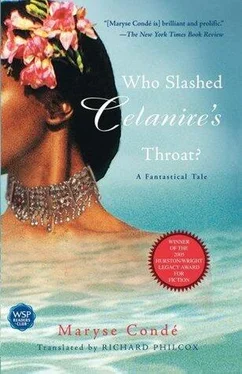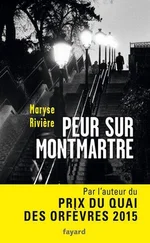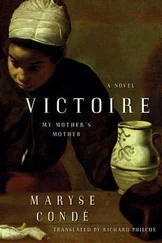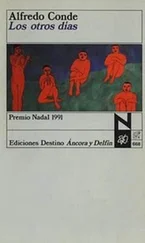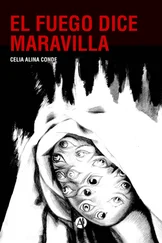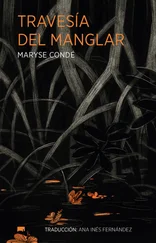Back at Betti Bouah’s, the racket had grown louder. According to tradition, the wake had to continue for the remainder of the night and part of the following day. When they finally got around to thinking of the burial, Thomas de Brabant’s guards rushed in. Governor Alix Pol-Roger was dead!
Dead? From what? How?
On his way back to Adjame-Santey he had stopped at the encampment of Tentona. It was well known for its abundant water supply and cool air, since it was situated on an escarpment fed by two rivers. While he was eating lunch, under the very eyes of his escort, he had been attacked by man-eating lions, those thick-maned black lions from Mourga, the very ones described by Amadou Hampate Ba. They had burst into the camp and without looking left or right had pounced straight on him, knocked him over, trampled and devoured him, leaving nothing behind but a pool of blood, a few bones, and a pair of legs still standing in tall, brown leather boots.
These unfortunate events brought together two men who up till then had had little contact with each other: Betti Bouah and Hakim. Betti Bouah was the opposite of his cousin Koffi Ndizi, as athletic and muscular as the other was potbellied. He spoke French to perfection and could read and write fluently. He was always prepared to discuss the eighteenth-century philosophers, especially Diderot, his favorite. In spite of the saying that the white man’s leader is the Englishman, Betti Bouah had sided with the French. He had lent them his support on every occasion; he had lodged Binger under his roof during his 1889 expedition. He hadn’t done all that only to have two of his sons mowed down by militia in the pay of the French. Following these dramatic events, he began to think twice about colonization and came to the conclusion that the Africans should join forces to kick the French out as quickly as possible and take their place. During his games of chess with Hakim, he laid out his plans. Since Hakim lent his fervent support, he offered him a job in his factories. The wages he proposed were three times higher than the mission’s. Hakim couldn’t believe his ears. To be rid of that mud-brick school, suffocating during the dry season, flooded during the rainy season! Of his dim-witted, fingers-all-thumbs pupils! Say good-bye to those hypocritical and finicky missionaries. Moreover, his cohabitation with Kwame Aniedo was becoming unbearable. He could no longer put up with hearing the prince noisily take his pleasure with his mistresses or bumping into him, quite naked, his pipe stuffed with Bahia tobacco wedged between his teeth. And that wasn’t the worst of it. Koffi Ndizi seemed to have lapsed into second childhood. Ever since he had set eyes on her at the wake for Senanou and Dabla, he had become infatuated with Celanire. He now only had one idea in his head: to invite her to his house. But when he looked around, he was ashamed at what he saw. He would never dare entertain someone so sophisticated in such a place. So he endeavored to imitate Betti Bouah and ordered armchairs, beds, dishes, glasses, and even a set of kitchen utensils from Grand-Bassam. Since Hakim had spoken highly of the Muslim art of living, he had rugs and wall coverings shipped from Tiassalé. Oh, how he would have liked to speak French, a language that up till then had always stuck in his throat! One afternoon, Hakim paid Koffi Ndizi a visit. The king had just received four crates of dishes from Grand-Bassam. He was inspecting plates and blue-stemmed glasses identical to his cousin’s, and frantically inquired of his visitor, What did he think? Would Celanire be impressed? At a time when the atmosphere in the colony was loaded with tension, such fickleness exasperated Hakim. He ran to Kwame Aniedo’s, collected his meager belongings, and took his leave without saying good-bye to anyone.
4
Hakim’s new life gradually settled into place.
Betti Bouah was in the business of palm oil. He bought it from the Akouri and Alladian villages or even farther afield. His men filled the casks supplied by the companies in Bordeaux and Nantes, and transported them along the Ebrié lagoon with a fleet of dugout canoes. They then rolled them overland and loaded them onto whaling boats that set out for the ships lying offshore behind the line of breakers. He also sold timber for dyes, ivory and skins that he purchased on the markets in the interior in exchange for gunpowder, guns, spirits, leaf tobacco from Virginia, cutlery, and knives. In short, he seemed a treasure trove for anyone who wanted to do business with him. Under his orders, Hakim no longer had time even to think about eating his bellyful. Up before sunrise, the noise of his little outboard would frighten the caymans wallowing lazily in the mud. Standing under the glare of the midday sun, he would quickly swallow a meatball of akassan reddened with palm oil. He dashed from one plantation to another, overseeing the loading. At first he did everything possible in the evening to keep up appearances. Once he had shaved and cologned, he went up and joined his host, who as a rule was sitting in a European-style armchair. Betti Bouah was very fond of chocolate and drank it by the cupful. While sipping this newly discovered drink, the two men would comment on what the French called “pacification” and what they themselves called quite simply “the war.” There seemed to be no end to the bloody massacres in the northern territories. How many dead had they already buried? How many more were they going to bury? Yes, Africa had got off to a bad start, and the white man’s sun illuminated nothing but misfortune. Sometimes, though, their conversation turned to a lighter side. They talked about women. Betti Bouah explained he had not been impressed by Celanire. A real bag of bones! He preferred full-bodied women, like a good Bordeaux wine. Just look at his wives. And then that ribbon tied around her neck terrified him like a small child. No doubt about it, that’s where she hid the mark that indicated she was the “horse” of dangerous aawabo . He had once known a “horse” with the distinguishing mark of a wart on his chin. It had taken years to find him out. In the meantime, he had killed off a whole village. Deep down, without daring to contradict him, Hakim scoffed at these superstitions, okay for Africans, but which his father’s European education had rid him of.
It wasn’t long, however, before he ached all over, and in the evening he would throw himself on his bed, fall fast asleep, and snore until morning. This extreme exhaustion naturally gave cause for thought. In fact, what had he gained by leaving the mission school? He was still a subaltern. He no longer had time to open a book. His hair was no longer combed or brilliantined. The people he kept company with were crude, the banknotes he handled were filthy, and he was no longer Mr. Philosophizer, phrasemonger of French French. It was that very moment Kwame Aniedo chose to ask Hakim to help him pass the colonial administration examination. Kwame Aniedo could no longer put up with the life of idleness dictated by Koffi Ndizi, and he could no longer bear to see him lapse into a second childhood because of his ridiculous passion for Celanire. So he had decided to leave the royal compound, which he considered a lost cause. He was prepared to leave the country for Dakar, the city where nobody ever dies. Apparently, the French were recruiting and paying for all sorts of clerks in their offices and administration. Kwame Aniedo could already see himself as a messenger in khaki uniform with gilt epaulettes pedaling his Motobécane. Hakim, never forgetting that Kwame had offered him a roof over his head when he needed one, saw himself obliged to calculate the square of the hypotenuse while in a state of exhaustion. What was worse, Kwame Aniedo’s presence still produced the same effect on him and upset him deep down: that smell of sweat and shea butter of his, that way he had of sucking greedily on his wooden penholder, that childlike expression of his whenever he no longer understood his lesson. Hakim despondently predicted that one day he would be unable to control himself and would throw himself on Kwame Aniedo. And that would be catastrophic. For the horrified Kwame would take out his Sheffield steel switchblade deep within the folds of his wrapper and stab him a fatal blow. Thus Bokar would get his revenge.
Читать дальше
